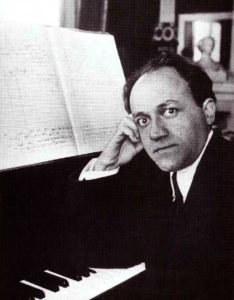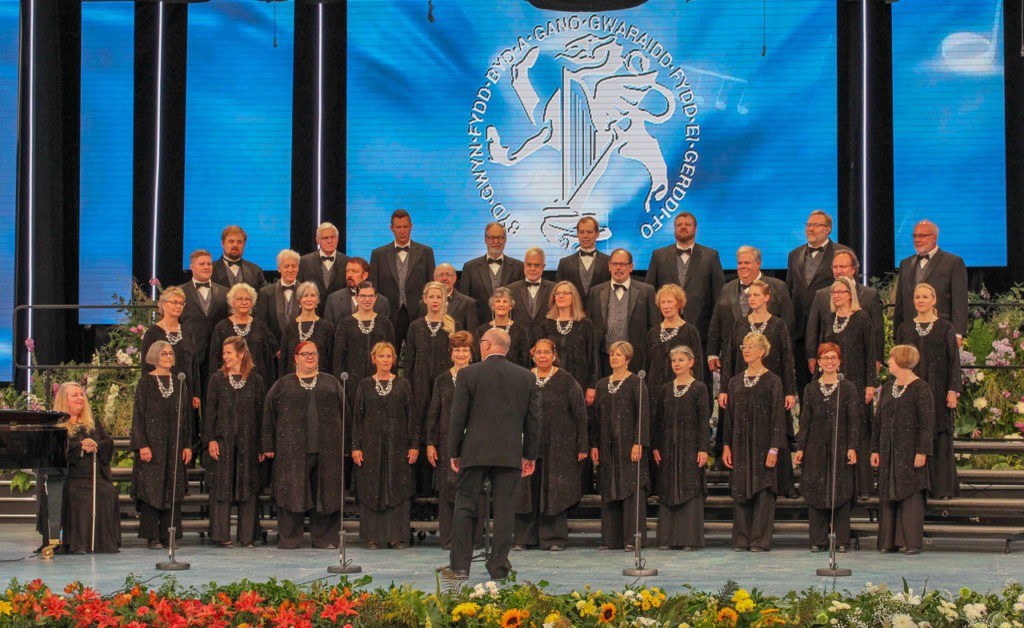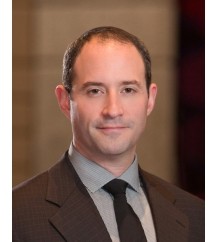By Hazzan Joanna Dulkin
On Tuesday, October 1st, 1930, The Jewish Daily Bulletin ran a story with this headline: Ernest Bloch Working on New Music for Synagogue Service. The article reads, in part:
Ernest Bloch, famous American-Jewish composer, is now at work on a new musical setting for the Jewish services, which he expects to have ready within a year…Rabbi L. Newman of Congregation Rodeph Sholom in New York, who was rabbi of Temple Emanu-El in San Francisco at that time, in explaining what new synagogual music by Mr. Bloch would mean, said:
“Mr. Bloch’s ‘Three Jewish Poems’, ‘Shlomo’, ‘Israel’ and ‘Avodah’, the last work having been written for [renowned violinist and conductor] Yehudi Menuchin, have placed him in the forefront as a masterful interpreter of the Hebraic spirit in music. It was natural that he should be asked to turn his mighty skill to the writing of synagogue music. During the six years that Mr. Bloch served as director of the Conservatory of Music in San Francisco he become fast friends with Cantor Binder, who aided him in preparing the historical sources for his new task.
“With characteristic thoroughness of research. Mr. Bloch is investigating Jewish literary and musical classics and, according to his own words, is immensely moved by what he finds.”
On March 3rd, 2019, you are in for a treat. Adath is thrilled to present the Minnesota premiere of Bloch’s Sacred Service in our Sanctuary. Performing the entire 50-minute work on our bima will be a choir of over 90 voices, guest Hazzan Daniel Gross of Detroit, accompanied by a 45 piece professional orchestra. The text of the piece follows the liturgy of the Reform prayer book of the time and is sung entirely in Hebrew with a spoken piece by the “Reverend” that is intended to be in the vernacular of the country in which it is performed. Our performance will be super-titled, so all can understand and take part in the experience.
Bloch indeed finished the piece within a year, and it was performed at Temple Emanu-El in San Francisco in 1933. Touted originally as “the Hebrew Messiah,” the piece and its composer are much less familiar today than they were 86 years ago. However, the work has not only survived, but become canonized in choral music – both because and despite its uniquely particularist text and content. It “works” on many levels—speaking to Jewish audiences who are familiar with the words of the prayer service such as “Sh’ma” and “Adon Olam”—and to general audiences of classical choral-orchestral works who are able to appreciate the musical virtuosity and sheer communicative power of the work.
Ernest Bloch, born in Switzerland but living most of his life in America, primarily composed works for orchestra and opera. About one-quarter of his works were devoted to Jewish subjects, and he collaborated with the great violinist and composer Yehudi Menuhin on a number of projects. Bloch felt a deep connection to his Jewish identity and this deep connection permeated his Jewish works. The Avodat HaKodesh was the answer to “his search for a Hebraic tonal art that would echo the grandeur of Judaic religious experience in the form of communication with that heritage’s guiding Divine spirit” (Dr. Neil W. Levin, Milken Archive of Jewish Music).
As I have been researching this piece, I am fascinated by the collaborative nature of how it came about. When Bloch served as the dean of the San Francisco Conservatory of Music, be became very friendly with the Cantor of the great Classical Reform Temple Emanu–El, Reuben Rinder. Bloch and Rinder desired to collaborate on a project, and Rinder secured the patronage of the cellist Gerald Warburg and the Stern Family of San Francisco to commission the Sacred Service. With the enthusiastic support of Emanu-El’s Rabbi of the time, Louis Newman (who would become one of the founders of Brandeis University), Avodat HaKodesh was situated as a capstone work of both modern classical music and of Reform liturgy. While Bloch worked on the composition in his native Switzerland, he reflected upon the process as a collaboration between himself and God—“a private affair between God and me. I am battling against notes, sounds, rhythms, to extirpate out of my soul all the unexpressed music which has been latent—for centuries—which has been awaiting this marvelous text.”
Adath’s partnership with Sonomento (MacPhail’s premiere vocal ensemble) and the Twin Cities Jewish Chorale echoes the original collaboration Bloch, Rinder, Warburg, Newman, and Congregation Emanu-El. We collaborators in 2019, individuals with common musical interests, and institutions of cultural and religious heritage have brought our gifts to help one another become stronger and more unified. Adath and MacPhail have embarked on a historic partnership to mount the production. Like Cantor Rinder before me, I helped research the liturgy, Hebraic pronunciation and liturgical context of the piece.
Sonomento conductor Craig Fields had the vision of performing Avodat HaKodesh in *our* Jewish sacred space, and will conduct the entire ensemble. Choral conductors Jerry Lehman and Gary Wolfman bring their many years of passion for and expertise in leading choirs in Jewish liturgical music, and our soloist Hazzan Gross brings his gifts of professional classical performance and pulpit artistry. Finally, our generous benefactors, and our incredible staff and volunteers on the TAMID committee, have truly made the performance here at Adath possible. The fruits of this unique collaboration will be richly enjoyed by all who take part in this special afternoon, and I hope to see you there.
***
Tickets can be purchased online at bit.ly/blochatadath. Tickets range in price from $18-$54 based on seating zone. Early bird pricing is available through January 31, 2019.




